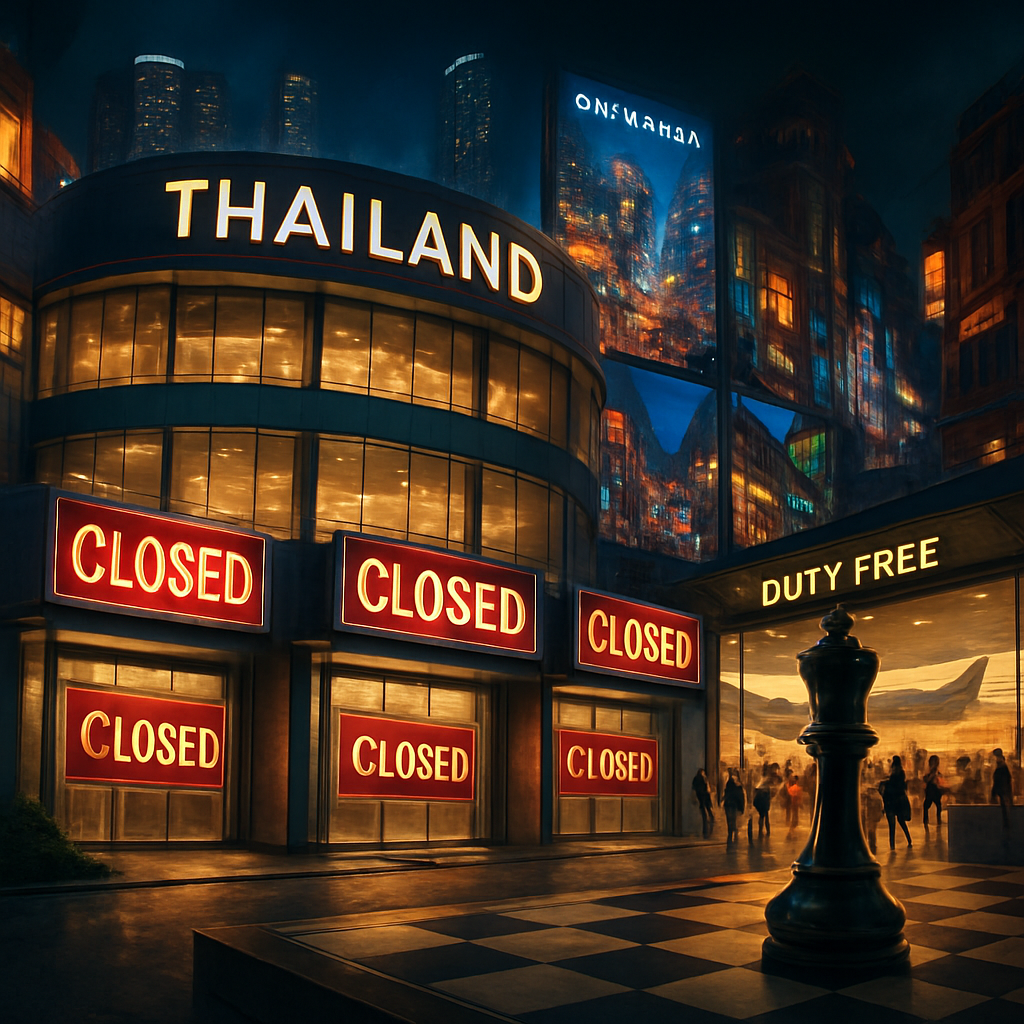Amid a whirlwind of economic recalibration and efforts to streamline their operations, Thailand’s illustrious duty-free titan, King Power, has made headlines—not just for its famed shopping experience, but for a strategic closure of three significant branches. Known for transforming commercial spaces into bustling hubs of consumer activity, the company is now hitting the “pause” button on their Srivaree, Pattaya, and Mahanakhon locations. These venues, which once resonated with the chatter and echo of lavish tour groups post-duty-free shopping sprees, will quietly lower their shutters come September. But the looming question is, why?
At the heart of the closure, according to the candid musings of CEO Nitinai Sirismatthakarn during an exclusive chat with Thansettakij, lies a blend of business pragmatism and vision. “Their business structures just don’t add up anymore,” Sirismatthakarn says, emphasizing the need for a sleeker workforce to soldier through an ever-changing retail landscape. Like a persistent fog that refuses to lift, the pandemic has left traces on the shopping habits of tourists and locals alike. No longer is there an endless stream of group tourists exploring city centers, urging duty-free stores to pivot towards catering to the whimsical fancies of individual travelers at airports.
Employees impacted by this transition will be offered a dignified exit through a voluntary redundancy program. This includes lawful compensation glitzed up with perks depending on how long they’ve been on the payroll. Fortunately, King Power isn’t entirely extinguishing its downtown presence; the spotlight will now shift to three other flagship stores—Rangnam, One Bangkok, and Phuket—as they re-imagine the symphony of city shopping.
Meanwhile, the airport arena remains King Power’s chessboard, where its queen stands strong. The company is recalibrating key concession agreements with the Airports of Thailand (AOT), casting their net over five major airports. Though once pondering to step back from these sometimes-arduous contracts, revised terms have manifested after intense negotiations. “It’s a bright stride forward!” exclaims Sirismatthakarn, appreciating the inclusion of state universities as third-party review bodies to ensure fairness.
Peering into the broader tourism telescope, the horizon is a mixed bag. With international arrivals taking a dip and Chinese tourists—previously the golden pool of inbound travelers—retreating by 33%, King Power is not alone in the storm. AOT shares too have reflected these tremors, nose-diving 35.6% since the year’s start as investors fret over thinning passenger streams and the subsequent downscale in duty-free revenue.
Nevertheless, King Power’s narrative continues weaving through Thailand’s retail landscape, a story of adaptation in a world of change. Their journey exhibits that even the mighty sometimes must re-strategize to stay ahead. One thing’s certain though, whether downtown or at the airport, King Power is undoubtedly plotting their next grand comeback—because, after all, repositioning isn’t just closing doors, it’s merely a prelude to newer horizons.


















I think King Power is making a strategic move to focus more on airport locations—it makes sense given the fall in group tourism due to the pandemic.
But isn’t it risky to rely so heavily on airports when international travel is still unpredictable?
True, but airports still get a steady flow of travelers compared to city centers. Plus, renegotiated contracts with AOT could mean better terms for them.
I agree with Sophia. Airports offer more controlled environments and consistent customer bases, regardless of the fluctuations in city tourism.
It’s sad to see the Srivaree and Pattaya locations closing. They were such vibrant places to experience local culture and duty-free shopping.
Focusing resources to fewer, more profitable locations is just smart business. Not every change needs to be seen negatively.
I get that perspective, but I wonder how this will affect the local employees. Even with a redundancy package, it can be challenging.
Exactly! Many employees’ lives will be disrupted, especially if they find it hard to get another job.
I suspect there’s more to these closures than they’re telling us. Corporate transparency isn’t always what it seems.
Totally agree! There could be financial troubles that they’re not airing out.
It’s just speculation, though. They were upfront about their reasoning being business pragmatism.
As much as I love shopping downtown, I’d rather see companies adapt than go under completely.
Adapting is crucial in today’s economy. It’s a tough call, but sometimes you have to let go of what’s not working.
Real bummer for tourists planning trips around these locations. Looks like it’ll be all airports from now on!
Good point! Shopping trips will definitely need to be recalibrated, especially for group tours.
I was planning to visit King Power in Pattaya next month! Such a disappointment.
You can still try their flagship stores or wait for a revamped experience in their airport locations!
The focus on airport operations could actually lead to an increase in high-spending travelers captured, leading to higher revenues even with less foot traffic overall.
That’s optimistic. It might work if they can capitalize on duty-free exclusivity and target high-value products.
Sounds good in theory, but how often does it work out that neatly? We’ll have to see.
Does anyone feel like this might increase prices due to lower competition in certain areas?
In the short term, maybe. But market dynamics often introduce new competitors or opportunities when demand is unmet.
Could the involvement of state universities in their airport contracts hint at a shift towards a more research-backed retail strategy?
All this tells me is less shopping convenience. King Power should consider pop-up stores as a flexible option in downtown areas.
Pop-ups could be a great idea! It would blend novelty with accessibility.
I just want to know if their Bangkok store will have more localized products now. Fingers crossed!
Anyone remember when duty-free was mostly seen as an airport thing? Maybe we’re just returning to basics.
Yep! Duty-free culture has shifted over the decades, adapting to whatever works best in the retail climate.